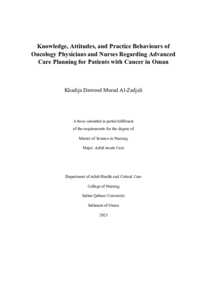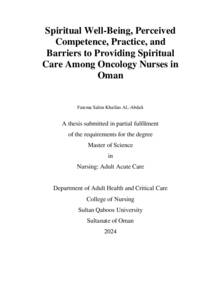وثيقة
Knowledge, attitudes, and practice behaviours of oncology physicians and nurses regarding advanced care planning for patients with cancer in Oman.
المصدر
Master's thesis
عناوين أخرى
المعرفة والمواقف والسلوك العملي لأطباء وممرضات الأورام فيما يتعلق بتخطيط لرعاية المسبقة للمرضى المصابين بالسرطان في عمان
الدولة
Oman
مكان النشر
Muscat
الناشر
Sultan Qaboos University
ميلادي
2023
اللغة
الأنجليزية
الموضوع
نوع الرسالة الجامعية
Master's thesis
الملخص الإنجليزي
Background: Preferences for end-of-life care for patients with cancer are often overlooked,
burdening patients’ families with decision-making. Advanced care planning (ACP) is a
multidisciplinary approach that supports engaging patients with progressive cancer in their
treatment course and providing them with a particular medical care based on their
preferences. However, there is a lack of studies that assess the oncology physicians and
nurses' knowledge, attitudes, and practice behaviour about ACP in Middle Eastern countries.
Purpose: This study aimed to assess the knowledge, attitudes, and practice behaviours of
oncology physicians and nurses regarding ACP for patients with cancer in Oman.
Methods: A cross-sectional, descriptive correlational design using standardized
questionnaires measuring knowledge, attitudes, and practice behaviours of oncology
physicians and nurses regarding ACP for patients with cancer was used. A convenience
sample of 296 oncology physicians and nurses were recruited from three tertiary hospitals
in Muscat. Both descriptive statistics (i.e., mean, SD, frequency, and percentages) and
inferential statistics (Pearson Correlation Coefficient and Independent samples t-tests) were
used to analyse the data.
Results: The participants consisted of physicians (28.7%, n = 85) and nurses (71.3%, n =
211). The majority of participants were female (73.4%, n = 218). The findings showed that
91.9% (n = 273) of the participants had knowledge about ACP that was less than 60%, with
a mean total score of 8.25 out of 14 (SD = 2.73), indicating poor knowledge about ACP.
Although, the participants had positive attitudes toward ACP, with a mean total score of
74.19 out of 105 (SD = 11.61), their practice behaviours regarding ACP were poor, with a
mean total score of 11.25 out of 20 (SD = 3.91). There was significant positive correlations
between knowledge and attitude, knowledge and practice behaviours, and attitudes and
practice behaviours regarding ACP (r = 0.238, p = 0.001; r = 1.046, p = 0.001; r = 0.294, p
= 0.001 respectively). The independent samples t-tests indicated that physicians had higher
knowledge and more positive attitudes about ACP (M = 9.07, M = 81.86 respectively)
compared to nurses (M = 7.87; M = 70.89 respectively) (p 0.001). However, there was no
significant difference between physicians and nurses in their practice behaviours toward
ACP (p = 0.077). The participants with a higher education level exhibited greater knowledge
and more positive attitudes towards ACP (p 0.001). The major barriers to implementing
ACP for patients with cancer were found to be a lack of knowledge (75.1%) and
communication skills in handling ACP (57.6%).
Conclusion: The study highlights the poor knowledge and limited practice behaviours
regarding ACP among oncology physicians and nurses in Oman. Improving knowledge
about ACP can lead to better practice behaviours and more positive attitudes toward ACP.
There is need for educational programs and campaigns targeting healthcare professionals,
policymakers, and the general public to enhance their knowledge and promote good
practices related to ACP. Hence, ACP courses should be included in the medical and nursing
curricula, covering ACP communication skills. The findings have implications for initiating
national ACP guidelines to support the implementation of ACP in Oman.
قالب العنصر
الرسائل والأطروحات الجامعية


